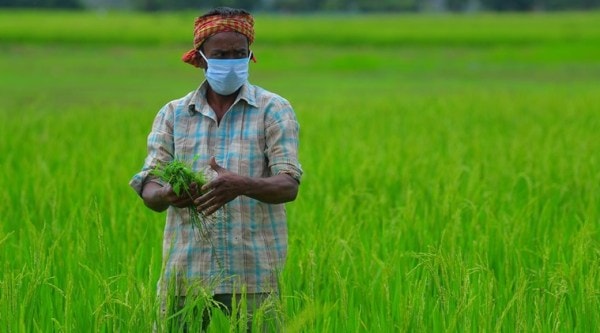 Agriculture experts suggested that instead of calling them ‘khet mazdoor’, a term ‘pendu mazdoor’ (rural labourers) is more suitable for such labour in rural areas now.
Agriculture experts suggested that instead of calling them ‘khet mazdoor’, a term ‘pendu mazdoor’ (rural labourers) is more suitable for such labour in rural areas now.
As a debate rages over filling the migrant labour gap in the fields with local khet mazdoors in Punjab, it turns out that only 35 to 40% of them are engaged in farming activities with majority employed in non-agriculture occupations. Farmers said that this is the primary reason that despite the availability of over 15 lakh local khet mazdoors, they have to depend on migrants to get farm work done.
Agriculture experts suggested that instead of calling them ‘khet mazdoor’, a term ‘pendu mazdoor’ (rural labourers) is more suitable for such labour in rural areas now.
President of the Kheti Mazdoor Union, Punjab, Lachhman Singh Sewewala, who has also conducted several surveys on the ‘khet mazdoors’ in the state, claimed that majority were not getting regular work in the fields which made them opt for other activities to earn living.
Prof (retd.) Gian Singh, an expert on farm labourers’ issues, said that “In the 1960s the farm labourers used to get 9-10 months to work in the fields during the year and around 6-month work was related to ‘goddai’ (hoeing) only. That time herbicides were not used to clear the weeds from the field and khet mazdoors would do it through hoeing. But then green revolution came in Punjab to mitigate the acute shortage of the food grain in India and more stress was given on mechanisation, hybrid seeds and usage of the herbicides, which abolish the showing practice completely and the employment days reduced to 45 to 50 days in the fields during the year”.
Experts from the PAU said that only 4-5 lakh local khet mazdoors are work all seasons in the fields and rest of them work as construction workers, brick kiln labourers, vegetable sellers, working on shops, and taxi drivers.
“In parts of Punjab ‘contractual employment’ is provided to farm labourers by the landlords under which they made an annual contract and a farm labourer gets fixed labour from his employer for a whole year, but not even 5 per cent khet mazdoors are employed under this system in the state,” added Prof Gian Singh, who had also conducted a survey on rural labourers recently.
Jaswant Singh (40), a khet mazdoor since 2002 from village Kheri Gillan, said: “I am a khet mazdoor but I am working on a brick kiln for the past several years because I hardly get regular work in the fields when wheat is harvested by combines and paddy transplantation is preferred to be done by migrants. This year too I could not get any work as in my village there are over 1000 khet mazdoors, but only 100 got farm work and remaining are working as labourers in the non-farming sector. I have four children for which I need regular work not work for 40 to 50 days only.”
Sukhwinder Singh Sony (29) of village Hathoa near Malerkotla has been khet Mazdoor since 2012, but has been working as a mason and hardly gets regular agriculture work. “I have never planted paddy though I work during the wheat season when fodder is made from the wheat stubble,” he said, adding that this time he was approached by some farmers to transplant paddy.
Mangat Singh (28), a graduate and BEd, from village Kauhrian in Sunam said that he has been working as khet mazdoor since he was in Class 10 as his father was also a farm labourer. “I tried for a job, but could not get any and decided to work as a farm labourer and daily wager .”
Tarsem Peter, president of Pendu Mazdoor Union (PMU), Punjab, said that due to lack of work in the fields, khet mazdoors, especially in the villages close to urban areas, have been working as daily wagers on shops, or selling vegetables.
“Those who are getting regular work in the non-farming sector, they prefer to work there instead of returning to fields for seasonal work. They want to work in the fields but irregular work discourages them,” he said.
Bikkar Singh, General Secretary of Zamin Prapti Sangharsh Committee (ZPSC), said that while migrants come only for seasonal work and go back to their states, such work structure is not suitable for local labourers who get employed at non-farming sectors and cannot return to seasonal farm work by leaving their jobs.
Echoing the same sentiment, Bhartiya Kisan Union (BKU) Dakunda, General Secretary Jagmohan Singh said: “When they get regular employment in other non-farming activities, it is difficult for them to leave that to take up few weeks farm labour work and this led to less participation of ‘Khet Mazdoors in the farm activities.”
A senior scientist at PAU, however, said that Punjab’s khet mazdoors being missing from the fields in large numbers had led to migrants stepping in to fill the gap.